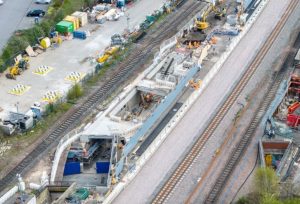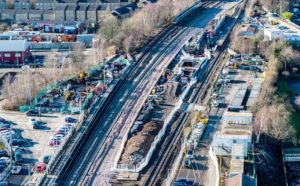Ambitious 10-year transport strategy laid out for city

The Connecting Leeds transport strategy has set out a vision for “Leeds to be a city where you don’t need a car”, where everyone has an affordable, low carbon, healthy and accessible choice in how they travel.
Leeds City Council has outlined ambitious plans to further transform transport and travel in the city over the next 10 years.
Following on from an investment of £380m worth of infrastructure improvements already completed or underway, the council has unveiled its latest Connecting Leeds transport strategy for the city setting out detailed plans for further major improvements up to 2030.
Among highlights of the plan are to:
- Contribute a reduction of up to 43% in CO2 emissions from transport by 2030.
- Aim for a 30% reduction in car mileage and a 130% increase in bus usage.
- To consider further measures to reduce air pollution and CO2 emissions from transport to achieve 2030 Net-Zero carbon target.
- Complete the first phase of investment in the public transport improvement programme, which runs until 2024, completing 30 infrastructure projects:
- Transforming Leeds city centre, City Square, and city centre cycle walking and cycling improvements.
- Outer ring road and bus corridor improvements, masterplans for Leeds Station and new railway stations at White Rose and Thorpe Park.
A key element of work already being carried out by the council and partners has been improvements in the road network and its infrastructure, as part of the £270m Connecting Leeds programme.
This includes completion of schemes such as the city centre gateway at The Headrow and Park Row, alongside the cycle superhighways and public transport enhancements.
In the last month, the country’s first fully solar powered park and ride facility opened at Stourton, operated by electric buses connecting into the city centre.
Over the next few months there are more major schemes to complete, with the Corn Exchange project, the A61 south and A647 bus priority routes. Also, the city’s other park and ride sites have been and will be extended.
A report on the Connecting Leeds transport strategy and action plan 2021-24, will go before a meeting of the council’s executive board, to be discussed on 20 October.
Leeds City Council leader, Councillor James Lewis, said: “This transport strategy will enable Leeds to retain its role as a local, regional, and national transport hub and prepare the city for the arrival of high-speed rail.

Councillor James Lewis
“We will continue to work and support the newly elected Mayor, alongside our joint efforts to transform the bus network.
“Maximising the transport investment, our approach will ensure benefits are distributed across the city and wider city region.
“We will need support from all partners and communities across the city to achieve these ambitious plans; most importantly we will need significant Government support and long-term funding.”
Leeds City Council executive member for infrastructure and climate, Cllr Helen Hayden, said: “The Covid-19 pandemic has brought about fundamental changes to how we live, work and enjoy our district.
“Moving our transport system towards a more accessible, active travel and public transport focused network, will allow us to achieve our vision of a city where a car is not required to meet mobility needs.
“We also have to recognise our approach must work across the whole of Leeds, in that rural areas may require a different approach.
“We know that people are willing to make small gradual changes from switching to electric vehicles, making more use of public transport, and reducing shorter car trips by walking, wheeling, or biking.
“I would like to thank those people who are already doing their bit and to keep up their momentum. But our ambition to be net zero from carbon by 2030, will still require even bigger changes.”
Nigel Foster, director of Fore Consulting and chair of the Leeds transport advisory panel, added: “The Leeds transport advisory panel supports the strategy and its ambitions for the future accessibility in the Leeds district.
“While significant progress has already been achieved, there’s still a lot more work to do to meet the scale of the challenges and particularly around decarbonisation and more sustainable travel choices.
“The council cannot address the ambition alone, it needs to be matched with active partnerships working with businesses, residents, and others, to transform mobility across Leeds.








